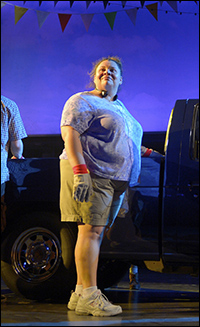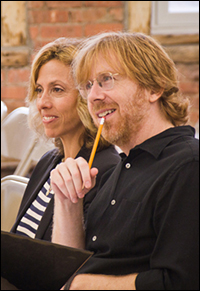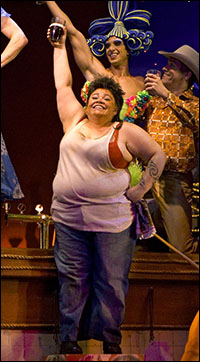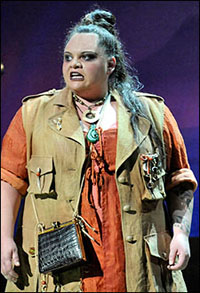
Keala Settle
The big-voiced singing actress Keala Settle, who made her Broadway debut in Priscilla Queen of the Desert, is back on The Great White Way in the new musical Hands On a Hardbody, which is currently in previews at The Brooks Atkinson Theatre prior to an official opening March 21. Based on the film of the same name, the fact-based musical concerns ten hard-luck Texans who are engaged in an endurance contest to win a pickup truck. Among those sharing the stage with Settle are Keith Carradine (Tony Award nominee, The Will Rogers Follies), Allison Case (Hair), Hunter Foster (Tony Award nominee, Little Shop of Horrors), Jay Armstrong Johnson (Catch Me If You Can), David Larsen (American Idiot), Jacob Ming-Trent (Shrek The Musical), Kathleen Elizabeth Monteleone (Tales of the City), Mary Gordon Murray (Into The Woods), Jim Newman (Curtains), Connie Ray (Next Fall), Jon Rua (In The Heights), Dale Soules (Hair), Scott Wakefield (Ring of Fire) and William Youmans (Wicked). Neil Pepe (Broadway's Speed-The-Plow) directs the production with staging by Sergio Trujillo (Memphis, Next to Normal).
Earlier this week I had the chance to chat with Hawaiian native Settle, who spoke about Hardbody, which features a libretto by Pulitzer Prize winner Doug Wright (I Am My Own Wife) and a score by lyricist and co-composer Amanda Green (Bring It On: The Musical) and co-composer Trey Anastasio (of the pop group Phish); that interview follows.
Question: Tell me, how did this role come about for you?
Keala Settle: I had just gotten into the city for Priscilla tech, and the very next day, in 2010, I was asked about it by my representation at the time. I saw the movie years ago so I knew what the movie was about, and I knew exactly what I was being called in for. I had no idea it was a musical, so I was really excited, actually, to do a play. So I tried to get in as fast as I could.
Question: What was the audition process like?
Settle: It was in the middle of tech. I had pin curls on and lashes and glitter lips, and it was in between tech and a preview, and I went in to audition — in full wig cap — and did my lines, and they asked for a song, and I said, "Why?" [Laughs.] They said, "Because it's a musical." And, I said, "Nobody told me that!" [Laughs.] And, my excitement dwindled because, you know, as an actor you always want to do plays, and you dream of being legit — whatever dream that is — and so I just said, "Okay, well what do you want to hear?" And, they asked for a gospel tune, and I think I sang "This Little Light of Mine" or something just off the fly. We went over to the piano and started rocking out.
Question: I've seen the TV commercial for the musical, and they show all the characters and underneath is a description of each character. Which character are you?
Settle: Norma Valverde. Question: Do you know how you're described in the TV commercial? Have you seen it?
Settle: I have. I have. Norma's quote is "Holding Out For Salvation."
Question: Describe her a little bit to me.
Settle: The character or her, because I've never met her?
Question: The character.
Settle: Obviously, it's one and the same, but she's an extremely devout Christian woman, who doesn't make a move without clearing it through God first. Yeah, she is the picture of that, and sometimes I'm sure people would think, in this day and age, it would be to her fault, but somehow, when she did this contest, it kind of brought people together on the truck because they realized they were kind of holding on for the same reason.
| |
 |
|
| Settle in Hands on a Hardbody. | ||
| Photo by Kevin Berne |
Settle: There are a few of them, yes. Hunter's character is based on a real person, Keith's is based on a real person, Allison Case's is based on a real person. We've actually met them. A few of them came in La Jolla and surprised us, and we had no idea until after the show. It was intense because nobody wanted to leave. We just wanted to keep asking questions and get a feel for who they were — all that stuff.
Question: What was their reaction to seeing it as a musical?
Settle: They were bawling. I mean, you've got to understand…those were real people, and that all really existed. Unfortunately, it does follow that stereotype of Middle America or whatever you want to call it. But they were worried that [the musical would be] kind of an attack — the fact that they are this small-town place, you know — and it couldn't have been more of the opposite. For them it was not only relief, but it was their real story being told.
Question: How much has changed from out-of-town to Broadway?
Settle: A little bit's changed, and I'm sure probably in the next week or so [there will be more changes]… We all believe in this show and have from the get-go for the past two years — some of us even longer because we've been involved for even longer — and believe in the message. We knew — at least I did — I fully knew that we weren't coming to New York with Swarovski crystals on our legs. It's a story. It's literally a play with music, and we're not going to hammer it in people's heads. It's society; it's what it is. Some people can handle it, some people can't. And, that's the human condition, and that's what our show basically shows everybody is that we are living the human condition, and it's okay. [Laughs.] You don't have to be mad about it. It's just by default, that's what we do. That's who we are, whether you're in Longview, Texas, or New York City.
Question: Tell me a little bit about working with the director, Neil Pepe.
Settle: It's great in the sense that not only the director, but the book writer, gives us a lot of room…a lot of space within the show to keep the competition going within each of our characters and to explore that so much more. It's a really, really open space as far as actor-wise, so everybody has a say… When you stand around on a truck for basically two years, you go nuts, so we're a big old family whether we like it or not, so with that comes all the good and all the bad of it. And, that's what's so great about it. One person can say, "I can't do that, it doesn't work," and in another breath, say, "That's probably one of the greatest ideas you ever had." It happens all the time because it never stops — that kind of work — so we have that every day, which is so great, and which is why all of us have stuck with it for so long.
| |
 |
|
| Amanda Green and Trey Anastasio observe an early rehearsal in La Jolla. | ||
| photo by Terri Rippee |
Settle: I don't know if it's for my character specifically, but it's for Hunter's character, when he sings his 11-o'clock number in the show. Right before he sings it, he goes to Norma's character and kind of questions whether there really is a God after everything his character has been through. And, it sets up, very nicely, [a big decision for his character]. Question: Did you go back and watch the movie again after you were cast?
Settle: Absolutely not. Absolutely not.
Question: What was your thinking?
Settle: Because to act is not to imitate. You're not imitating. When you act, you're being. So if I were to go back and watch a movie of anything that I was doing, I would go back and go, "Well, I'm going to pretend like I'm imitating this person playing this character." I don't want to ever do that. If someone puts a character in front of me — no matter what it is, whether there has been a film or not — I want to be that character, not imitate it. There's a difference — a big difference.
Question: You mentioned before the message of the musical. What message does it have for you?
Settle: For me, I want to say whether or not you believe in God — or a universe, of any kind, that's watching over any of us — you can have faith that things will go your way as much as you want to, and they won't. When they don't, you have to know it's okay because other people at a truck, or in your community, or at your apartment are there to catch you without fail — simply because that was how we were created. No one was created to be alone. We can try as hard as we want. Even at the beginning of this show, everybody's in their own world, trying to just be at the truck [thinking], "I'm not going to pay attention to anybody." And, in the long run, they have to — simply to stay awake — stay in the contest, so whether it's a truck, whether it's a divorce — whatever the case may be — it's the same idea. It's all relative. It's just whether or not we as human beings really want to go there because that's a lot of work for us. That's a lot of acceptance and a lot of truths that some of us don't want to know about, and that's what it is. So, people can go there or they won't, but that's the beauty of it — that you get the option, especially when you just go to a show. I mean, this is, by no means, therapy or Paxil. [Laughs.] But it is an insight on the human race — and a good one in all aspects.
Question: Since we haven't spoken before, I was wondering where you were born and raised.
Settle: I was born and raised in Hawaii.
Question: When did you start performing?
Settle: In the bathroom when I was two. My mother couldn't shut me up!
| |
 |
|
| Settle in Priscilla Queen of the Desert. | ||
| Photo by Joan Marcus |
Settle: To be honest with you, I really am not a musical theatre performer. I'm more an R&B singer and have been doing that my whole life. My mother is — well, was — also an R&B singer, in New Zealand — she's a native of New Zealand — and did a lot of Dusty Springfield as well, stuff like that, and it kind of passed on in our family because it's a cultural thing, because all of us sing. But, I guess for me, I got into musical theatre really late in the game because I didn't really know you could do it because I was too busy wanting to sing backup or doing studio work singing chorus stuff, and singing backup for Gladys Knight in Vegas — because I was living in Vegas for a while, very briefly. The funny thing was that I remember reading they had an audition for Hairspray, and I wanted to be one of the Dynamites. [Laughs.] That's how clue-free I was — just so you know. I went into an open call in Los Angeles and went, "I'm going to come out being a Dynamite because I'm going to blow this out of the water! I couldn't be more black, trust and believe." [Laughs.] And, I walked in there and came out — eight auditions later — being the standby for Tracy Turnblad. And, I thought, "What is going on?" … All the way to the first day of rehearsals, I figured they had 24 hours to fire me and say this is a joke because I don't get it, but if you get it, then I'm good. [Laughs.] That was the last person I wanted to play.
Question: Did you end up taking that role? Did you get to go on…
Settle: I did! I went on quite frequently, and finally the girl that I was the standby for — she was transferred to New York, and then I just took over her spot. That was six months in, and I finished out the tour.
Question: What was that like for you, stepping into the world of musical theatre?
Settle: It was scary because it was my very, very first big thing, and I didn't know how to live in that world. I mean, I'd done bits and pieces of musical theatre, which was really like R&B stuff, in Vegas, but it was never the real thing. I went from nothing to everything, and I didn't handle it very well and ended up getting really sick. And, once the show ended, I had to leave the business for a few years and kind of get myself back together and in order.
In the interim, during those years, because I had spent so much time with stagehands on the road, they ended up looking after me the last year, and so I kind of started getting into their industry… Because I didn't want to leave the stage completely… I wanted to be a part of it, and so I talked to as many people as I could, who were sound designers — asking them, "Where did you guys work?" They do all these out-of-town shows in La Jolla or San Diego, and I thought, "Well, maybe I'll just go over there," and I got in the car and drove one way to see what would happen — and that was working with all these great designers… All these people that were teaching me and, at the same time, keeping me alive because it was the only thing I wanted to do.
I did that for a couple years, and I finally saw that they were doing some production of South Pacific somewhere — in Texas or something — and I was like, "Maybe I'll just go do that real quick to see if I still have anything, and I found out that it was the Lincoln Center production," and that was it. I got called in, and came back.
| |
 |
|
| Settle in South Pacific. | ||
| photo by Peter Coombs |
Settle: It was scary. It was really, really, really, really scary — to the point where I had to pull the director aside and said, "I can't do this. I can't come back to this." I had forgotten how different the world is — the two different worlds are… From being a member of IATSE to being a member of Actors' Equity — they're so completely different. We work together towards the same goal, but the mindset is completely different, and I didn't know if I could do it.
Question: What was it like for you getting to Broadway with Priscilla?
Settle: I was scared because I wasn't originally a fan of this city. I mean, I was raised on a rock in the middle of the Pacific Ocean… You walk off the plane in Hawaii, you get a lei and a hug — completely different — but, you know, I could live in that world and say, "I hate that, I hate that, I hate that." Or, I could just roll with it and be me. I just do that, hopefully… [Laughs.]
Question: Last question. How has audience reaction been to this show so far?
Settle: I think it's been fantastic. I think a lot of them were expecting something completely different, and, you know, by the time intermission hits, they're all looking at each other going, "Oh my gosh, I can't believe this is happening!" [Laughs.] The music that we're singing — it's like a rock concert. It's a dream… We have old-school people in the pit… We have serious rockers in the house, and it's fun to have them a part of our show.
[The Brooks Atkinson is at 256 W. 47th Street. Tickets range from $55-$155, and are available at the Brooks Atkinson Theatre box office and at Ticketmaster.com or at (877) 250-2929. For more information, visit handsonahardbody.com.]
Well, that's all for now. Happy diva-watching! E-mail questions or comments to agans@playbill.com.










